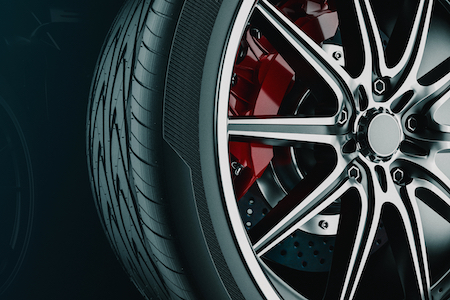With every part of your vehicle, there’s a set of guidelines to ensure they remain in top condition. As they wear, there are also suggested plans of action for repair and replacement, to ensure you’re never stranded by the side of the road.
One of the most common reasons you’ll find people pulled over along the highway is for a flat or blown tire. It’s one of the most common repairs, because your tires are constantly under pressure.
When you purchase new tires, they promise you they’ll last 40,000, 50,000, even 60,000 miles or longer. The reality of that depends on how well you care for the tires during that time frame.
No, you can’t put new tires on and forget about them. Tire rotation is a crucial part of giving tires their longest lifespan.
What is tire rotation?
Tire rotation means periodically moving the tires to a different position on your vehicle. You should rotate them as recommended by your vehicle’s manufacturer, or about every 5,000 miles. To make the process easy, you might consider bringing your vehicle in for an oil change, and have the tires rotated at the same time.
When a mechanic rotates your tires, it also gives them a chance to inspect them for other potential problems. They can check air pressure, look for visible signs of damage, and check their tread depth. If you’ve noticed anything unusual with the way your car drives, let your mechanic know. It’s a perfect time for them to inspect the tires in more detail to ensure a safe drive for you in the coming months.
Why should tire rotation be a part of your regular routine?
Tire rotation is important for several reasons.
Potentially the biggest reason is to ensure you get the full mileage from your tires. By rotating them and putting tires in new positions every few thousand miles, it ensures the tread life is maximized. Tires on the front of a front wheel drive vehicle take a larger portion of the friction as you move down the road. Each wheel could have its own little quirks about pressure and the way it handles on the road. Rotating them changes the way each tire connects, and gives them the best chance at an extended life.
Also, even pressure on a tire ensures even tread wear throughout the life of a tire. Tread depth helps with traction on the road. Because we have a variety of weather conditions here in Colorado, connection is everything. With proper tread depth, you’ll ensure the safest levels of cornering and braking performance your vehicle can offer. That means a safer drive for you, your passengers, and the people around you.
If you have an all-wheel drive car, keeping your tires in balance means less stress on the drivetrain. And that can amount to less maintenance over time.
Is 5,000 miles suggested or mandatory?
We see all kinds of advice online that suggests mileage markers as a guideline instead of a rule. Ultimately, it’s about two things.
First, you should always consult your owner’s manual for maintenance requirements. The people who built your vehicle have the best understanding of how to maintain it. When in doubt, heed their guidance and follow their advice.
Second, Nothing is ever cast in stone. However, if you wish to keep your car in the best condition possible, and avoid potential problems that could impact your drive, erring on the side of being consistent with checkups will never hurt.
Allowing a mechanic to inspect your vehicle regularly gives them a chance to find potential problems before they escalate. With tire rotation, they can determine any potential problem with your tire before it gives you trouble on the road.
It reduces the cost of an expensive repair, giving you a chance to fix it before more goes wrong with your vehicle.
Other reasons to rotate your tires regularly
While your tires are an expensive part of your vehicle, parts you’ll be replacing regularly as you drive, there are other reasons to inspect them regularly.
While regular tire rotation can ensure your tires the longest life, it also ensures your safety. If tires don’t wear evenly, it can increase your risk of a blowout. At a minimum, it will impact the performance of how you drive, and can lower your gas mileage, making you spend more at the pump each time.
Your tires are also largely responsible for braking. Think of your tires as a protection system for the wheels. If tires are overly worn, they can jar the wheels, impact the brakes, which can cause you problems in emergencies. Ever had to stop quickly and your brakes not perform the way you’re used to? It could be a problem with your tires.
Especially on a front-wheel drive car, it uses gripping for traction. If the tires on the front are compromised, it can affect your car’s performance overall.
What happens during tire rotation?
Above all, tire rotation gives the mechanic a chance to inspect the tires and determine if there is a potential problem. This stops issues in their tracks. It also allows them to look at a variety of conditions, from proper inflation to how they are impacting the drivetrain. They also check tire safety, looking for things like overinflation, blistering, or cupping on your tires.
In most cases, tire rotation involves moving the front tires to the rear, and the rear tires to the front. There are other possible patterns depending on what the professional finds, and according to your manufacturer’s guidelines.
What’s your next step?
When was the last time you had your tires rotated?
When was the last time you scheduled a maintenance visit with your local mechanic?
Regular inspections are the easiest way to keep your vehicle in good condition, create peak performance, and reduce the cost you’ll spend on repair bills when things go wrong.
It’s your early warning protection system.
Schedule your maintenance visit today.

